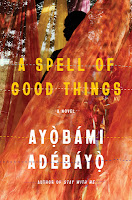Book Review: A Spell of Good Things by Ayọ̀bámi Adébáyọ̀

Rating: 3.5⭐
“She had never been able to shake the sense that life was war, a series of battles with the occasional spell of good things.”
Set in modern-day Nigeria, the narrative of A Spell of Good Things by Ayọ̀bámi Adébáyọ̀ revolves around two characters from vastly different walks of life - Ẹniọlá, a teenager who belongs to a family struggling to make ends meet and Wúràọlá, a young doctor from an affluent family - and how their lives become intertwined through an episode of violence and tragedy.
Ẹniọlá dreams of pursuing his education in a good school as his father had once promised. But his father, a teacher by profession, loses his job, and the family is unable to fund his or his sister Bùsọ́lá’s education. Ẹniọlá works odd jobs in a tailoring shop, unable to pay for an apprenticeship but hoping to acquire some skills while also earning some money. He, along with others in similar situations, is regularly punished by school authorities for their inability to pay fees and face expulsion once the stipulated grace period is over. In a bid to better his family’s circumstances, he gets embroiled with a local politician – an association that will irrevocably change his life.
Wúràọlá is twenty-eight, and despite her academic accomplishments and hard work, she submits to social and family pressure to find a husband. She accepts her childhood friend/ boyfriend Kúnle’s proposal, though her heart is not completely in the relationship. Both her father and her future father-in-law are associated with local politics, and the marriage between the families is a coveted union. Her need to keep the families happy and keep up appearances overrides her doubts about her feelings, and she finds herself hiding her fiancé’s true nature.
I loved the premise of A Spell of Good Things by Ayọ̀bámi Adébáyọ̀. The prose is superb, as is the character development. I enjoyed the vivid descriptions of the setting, culture and traditions of the community and the dynamics within the families. The story revolves around themes of socio-economic inequality, politicization and regulation of the school system, political corruption, depression, and domestic abuse, among others. I found Ẹniọlá’s storyline emotionally impactful, and though I could sympathize with Wúràọlá and her family toward the end of the novel, I thought that her story was lacking in depth. The pace is slow for a larger part of the novel and suffers from minor repetition. There are many characters to keep track of, and while I enjoyed reading about the large families and extended families, there were certain characters whose stories felt important but remained somewhat unexplored. The final segment is shocking and heartbreaking and will stay with you long after you have finished the book.
Though there is a lot to like about this novel, I was not completely engaged in the narrative for most of the novel. Having said that, I do hope to pick more of the author’s work. I did feel the need for a glossary/key/index for all the Nigerian words and phrases in the narrative, which would have made for a more fluid reading experience.
“Time was unforgiving, it didn’t stop, not even to give people a chance to scrape themselves off the floor if they’d been shattered.”
Comments
Post a Comment